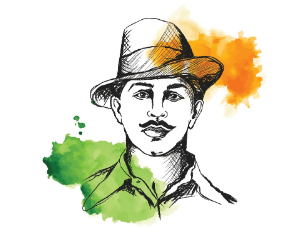Unsung Heroes of India’s Independence
India’s struggle for independence is a tale of unparalleled bravery, sacrifice, and determination. While history remembers many names, several extraordinary freedom fighters remain underrepresented in popular discourse. As we celebrate the fruits of their sacrifices, let us take a moment to honor five legendary figures whose unwavering courage helped shape the destiny of our nation.
1. Bhagat Singh: The Fiery Revolutionary
A symbol of resistance and youthful rebellion, Bhagat Singh remains one of India’s most revered freedom fighters. Born in 1907 in Punjab, he was deeply influenced by the Jallianwala Bagh massacre and the brutal repression of revolutionaries. Determined to free India from colonial rule, he embraced radical activism. His most audacious act—the bombing of the Central Legislative Assembly in 1929—was a statement against British tyranny, not an attempt to harm. At just 23, Singh was hanged, but his fearless defiance and powerful ideology continue to inspire generations.
2. Rani Lakshmibai: The Warrior Queen of Jhansi
A beacon of courage and resilience, Rani Lakshmibai is one of the most formidable figures in India’s fight against British rule. Born in 1828 in Varanasi, she became the Queen of Jhansi and fiercely opposed British attempts to annex her kingdom. In the 1857 Rebellion—India’s First War of Independence—she led her troops into battle, dressed as a soldier, wielding a sword with unmatched bravery. She fought relentlessly until she fell in battle in 1858. Her legacy remains a source of inspiration, especially for Indian women.
3. Subhas Chandra Bose: The Leader of the Indian National Army
A visionary leader and fierce nationalist, Subhas Chandra Bose, or “Netaji,” believed that India’s independence could only be won through armed struggle. Born in 1897 in Cuttack, Odisha, Bose initially worked within the Indian National Congress but later parted ways due to ideological differences with Mahatma Gandhi. In 1943, he formed the Indian National Army (INA) with Japanese support, rallying soldiers and civilians under his famous call: “Give me blood, and I will give you freedom!” Though his mysterious death in 1945 remains debated, his relentless pursuit of freedom left an indelible mark on India’s history.
4. Sarojini Naidu: The Nightingale of India
A poet, orator, and freedom fighter, Sarojini Naidu was a leading voice in India’s independence movement. Born in 1879 in Hyderabad, she was a gifted student who studied in England before returning to join the struggle. A close ally of Mahatma Gandhi, she played a key role in the Civil Disobedience Movement, the Salt March, and the Quit India Movement. Naidu was also a staunch advocate for women’s rights, becoming the first woman to preside over the Indian National Congress. Her eloquence, leadership, and dedication to social justice cemented her place in history.
5. Sardar Vallabhbhai Patel: The Iron Man of India
A pivotal force in India’s fight for freedom and unification, Sardar Vallabhbhai Patel is known as the “Iron Man of India.” Born in 1875 in Gujarat, Patel initially built a successful legal career before dedicating himself to the independence movement. He was a key leader in the Non-Cooperation and Quit India movements, using his sharp political acumen to mobilize the masses. After independence, he played an instrumental role in unifying over 560 princely states, earning the title of the “Bismarck of India.” His vision and leadership were crucial in shaping modern India.
Honoring Their Legacy
These five extraordinary freedom fighters, each with a unique path and approach, played an integral role in India’s journey to independence. Their sacrifices remind us of the values of courage, unity, and patriotism. As we honor their memory, let us pledge to uphold the ideals they fought for and work towards a stronger, more united India.









